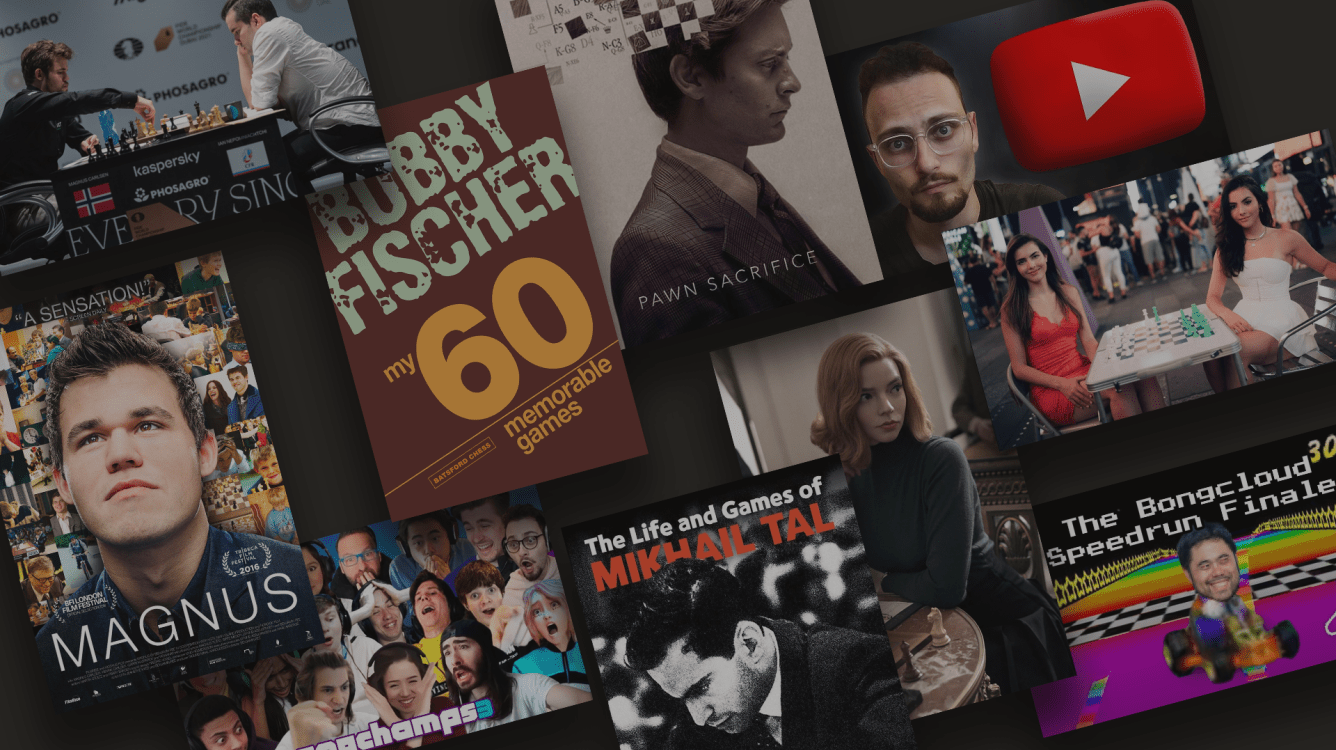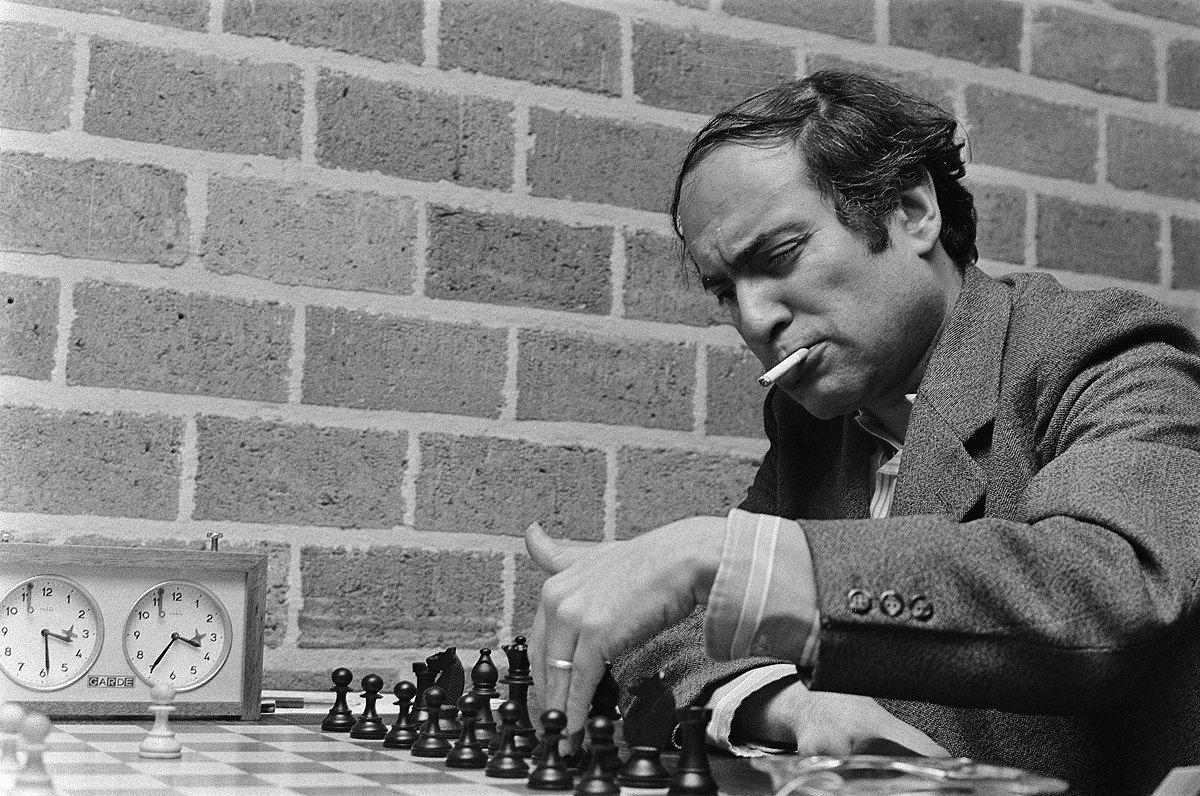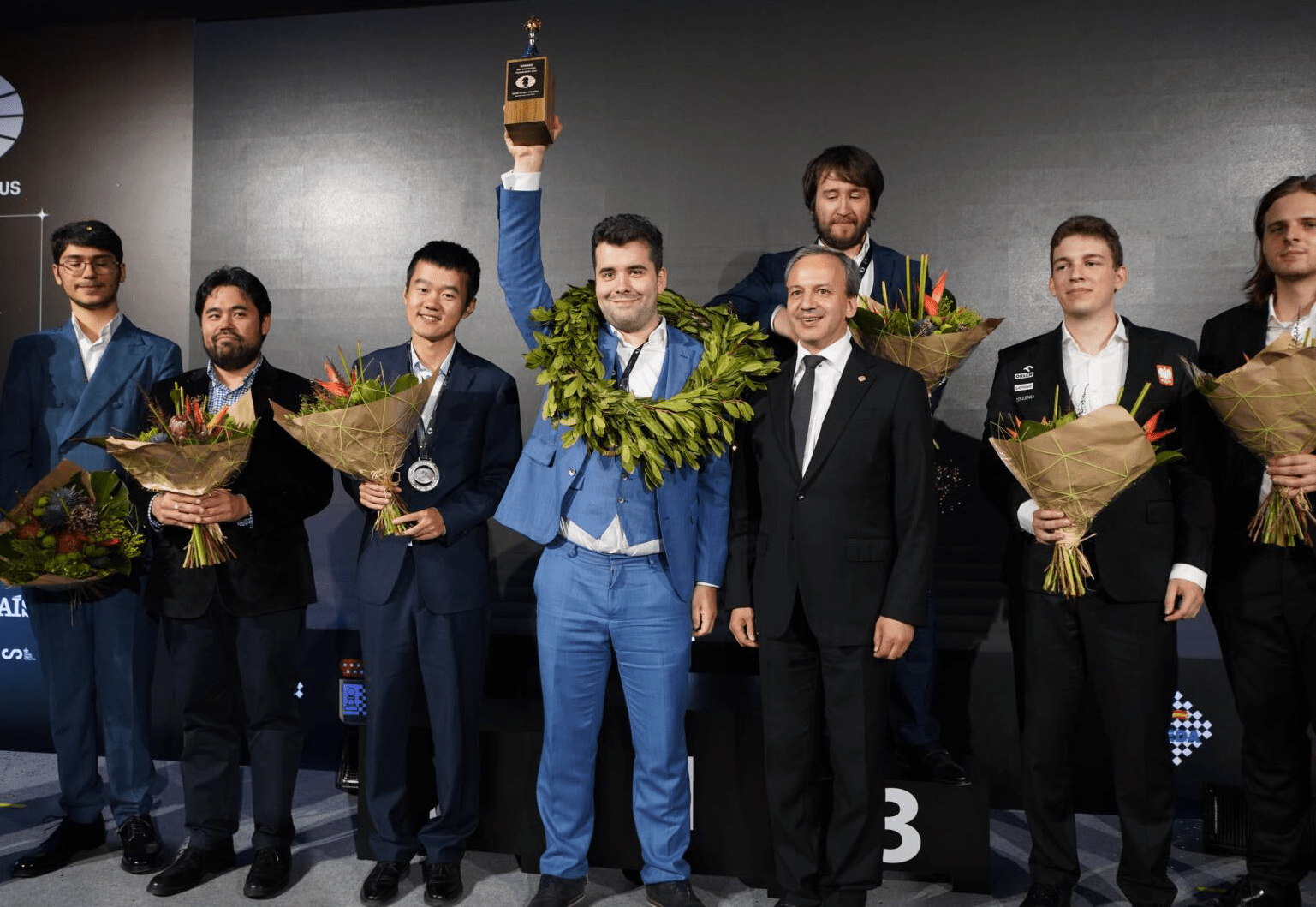
Everything You Need To Know About Chess Culture
If you are someone who has only started playing chess in the last year or two, you may already know about The Queen's Gambit or GM Hikaru Nakamura's stream. But if you want to understand chess culture at a deeper level, there are many more references that you can enjoy.
Below is only a limited recommended list of movies, streams, books, and more that can help make you a true aficionado of the game. See how many you already know or click your favorite or most interesting unknown to read ahead.
- Film & Television
- YouTube & Twitch
- Books & Literature
- My Great Predecessors (by Garry Kasparov)
- My 60 Memorable Games (by Bobby Fischer)
- The Life and Games of Mikhail Tal (by Mikhail Tal)
- Mind Master (by Viswanathan Anand)
- Game Changer (by GM Matthew Sadler and WIM Natasha Regan)
- Chess Queens (by Jennifer Shahade)
- How To Reassess Your Chess (by Jeremy Silman)
- Twitter and Reddit
- Podcasts
- Events
- Conclusion
Film & Television
The Queen's Gambit (2020)
The newest film (ok, miniseries) on the list is also by far the most popular and is responsible for much of the present chess boom. Something about the story of Anya Taylor-Joy as Beth Harmon captivates general audiences, not just chess fans.
It depicts the chess world of old, of course, with its Cold War themes and adjournments. But some things remain consistent: simultaneous exhibitions (episode one), blitz games played for money (episode five), and draw offer etiquette (seven). Even using the restroom for performance enhancement! In episode two, Beth Harmon takes her visualization drugs there in the middle of a game; in the last decade or two, some less elegant cheaters have taken to using engines on their phone while in there.
Searching For Bobby Fischer (1993)
The famous movie dramatizing the youth of IM Josh Waitzkin, Searching For Bobby Fischer is more than a film about the pressures of scholastic chess on children, parents, and coaches alike. The scene where Ben Kingsley, as NM Bruce Pandolfini (in name only), shows the tournament hall to Joe Mantegna, portraying Fred Waitzkin, embedded a certain concept of a chess master in the minds of viewers. (Obligatory disclaimer: While GMs Joel Benjamin and Roman Dzindzichashvili played themselves, an actor played FM Asa Hoffman, who was not happy with his portrayal.)
A more relevant scene to the general theme of the movie is the confrontation between Mantegna and Josh's teacher, one of Laura Linney's earliest film roles.
The book is obviously good enough to inspire the film, too, and contains a truer version of the Waitzkins' story. Even the world's harshest critic of chess writing, Edward Winter, was a fan of the book.
Magnus (2016)
By chronicling the rise of a specific world champ, the 2016 documentary Magnus is able to get into details of being a top-top super GM, instead of giving a broad overview of multiple experiences. Ten years of filming went into the production, giving viewers a long-term look rather than a snapshot of one match.
Magnus is valuable to anyone who wants to know the details of Carlsen's rise to power as the first world champion in the dominant engine era.
The History Of Chess: The World Chess Championship (2022)
The one Chess.com project on this list gives a broad overview of the world championship and all the effects that the outside world had on it. Check it out if you want a broad treatment of the entire championship, not just one player.
The Queen of Katwe (2016)
WCM Phiona Mutesi began her life very far from the chess world, but after finding the game, she was able to better her own life and her family's. ESPN reporter Tim Crothers caught on to her story and published the book The Queen of Katwe in 2012. The dramatization, of an already dramatic story, came out four years later.
Pawn Sacrifice (2014)
Perhaps no outside event influenced chess culture more than the Cold War. It's interesting that it was in the 1970s, when "detente" ostensibly began to soften some of the political tension, that chess peaked as a proxy battle in the same struggle.
Pawn Sacrifice is Tobey Maguire's character study on GM Bobby Fischer, which also dramatically portrays the geopolitics behind the match.
In fact, both world championship matches in the decade—Fischer vs. GM Boris Spassky in 1972 and GMs Anatoly Karpov vs. Viktor Korchnoi in 1978—featured a Soviet star against a Soviet enemy, and both have been subjects of documentaries. Closing Gambit about the 1978 World Championship features commentary from GMs Garry Kasparov, Viswanathan Anand, Peter Svidler, Karpov himself, Yasser Seirawan, and others.
YouTube & Twitch
Chess streaming and chess videos existed before 2020 but became far more popular during the lockdown. It is now impossible to get a fair picture of chess culture without watching at least one YouTube video or one stream from content creators, including but not limited to:
| Creator | Name | YT Subs (Follows) | Twitch Follows |
| GMHikaru | GM Hikaru Nakamura | 1.37M | 1.5M |
| GothamChess | IM Levy Rozman | 1.64M | 612K |
| Agadmator | Antonio Radic | 1.25M | 20.8K |
| BotezLive | WFM Alexandra Botez and Andrea Botez | 916K | 1.1M |
| ChessBrah | GMs Eric Hansen and Aman Hambleton | 291K | 283K |
Hikaru Nakamura
The biggest combination of chess talent and streaming talent in the world clearly belongs to Hikaru. Most chess content creators are either big on YouTube or big on Twitch, but Nakamura is equally popular on both platforms, in addition to being one of the 10 best classical chess players in the world and one of the two best at blitz.
Whether it's his high-level play or the way he expands the horizons of the game, Hikaru is the chess world's most essential individual streamer.
GothamChess (Levy Rozman)
Hikaru is the king of chess on Twitch, but YouTube's biggest chess personality is IM Levy Rozman. Hikaru's pure chess skill sometimes goes beyond the comprehension of his viewers, but Levy, while no slouch as an international master, is always able to break the game down into digestible lessons.
Alexandra & Andrea Botez
The Botez sisters, like Nakamura, are equally adept at the Twitch and YouTube games. A 2021 trip to New York City produced several million-view videos.
Agadmator (Antonio Radic)
The "O.G." of YouTube chess content, Agadmator is as popular as ever. He, Nakamura, and Rozman were in a race for one million YouTube subscribers, which was ultimately won by Agadmator in February 2021.
If a big chess game just ended, you can expect Agadmator's take on it within hours.
ChessBrah (Eric Hansen, Aman Hambleton, et al.)
If Agadmator is the YouTube "OG," then ChessBrah is the Twitch OG. GM Eric Hansen, GM Aman Hambleton, and company have been streaming since Twitch first became a thing in 2011. ChessBrah has a strong YouTube following as well, for those who just want stream highlights like this:
Others
Arguably no type of media is more relevant to chess culture in the 2020s than the stream, so if you've explored the "big five" and still want more, the possibilities are nearly endless. Just a small sampling of other options:
- WFM Anna Cramling
- GM Ben Finegold
- Arena Kings GMs Jose Martinez, Minh Le, and Oleksandr Bortnyk
- WFM Maria Emelianova
- GM Alexandra Kosteniuk
- WGM Nemo Zhou
- GM Daniel Naroditsky
- FM James Canty
- IM Eric Rosen
- NM Kevin Bordi (French language)
Books & Literature
My Great Predecessors (2003)
It may be hard to remember, but GM Garry Kasparov published the first of five volumes of My Great Predecessors while he was still an active professional chess player in 2003. His analytical mind was thus as sharp as ever, but there is more to the series than just games and analysis.

Through its chronological approach, the series presents a theory of the evolution of chess culture, mainly in terms of fashion and trends over the board, from the 17th century through the end of the 20th. Although some have criticized its narratives, notably IM Willy Hendriks in his On The Origin Of Good Moves, Kasparov's work remains his chess magnum opus.
My Great Predecessors is also one of the few chess books that attempt to place the game in the wider culture. You can actually read this in the Amazon "Look Inside" preview of the first volume.
My 60 Memorable Games (1969)
If you only ever read one game collection (although My Great Predecessors is sort of one), it should be Fischer's My 60 Memorable Games. Bronstein's Zurich 1953 would be a second choice.

Fischer's book came out before he became the world champion in 1972, but the games and details featured in it explain top-level chess thinking better than still almost any book since.
The Life and Games of Mikhail Tal (1978)
This autobiography mixed with game analysis features a real-life version of the chess world depicted in The Queen's Gambit, the settings in time being roughly concomitant. Among countless stories Tal relays, one includes how GM Nona Gaprindashvili, who famously sued and settled with Netflix for defamation over comments made about her in the miniseries, insisted in her game against Tal that he stop "forgetting" to hit his clock.

Every Tal story tells you a little something about the culture he was playing in.
Mind Master: Winning Lessons from a Champion's Life (2019)
Mind Master, Anand's memoir, is like a more modern version of Tal's, minus the in-depth game analysis. This choice by Anand, who had written a game collection before, allows him to distill even further into the life of a champion than even Tal could.

Game Changer: AlphaZero's Groundbreaking Chess Strategies and the Promise of AI (2019)
Computers have changed chess forever on multiple occasions, providing plenty of fodder for books and movies. If you want to understand the full effect, no single volume is better than Game Changer.
Its first chapter is especially relevant to chess culture. GM Judit Polgar, who came through chess in the late 1980s and the 1990s, states in the book about using computers in preparation: "It's not something you can choose to use or not: like it or not, it's there and you have to use it." For today's youngest stars, machines have become so omnipresent that even the idea of choosing not to use a computer is a bit foreign.
Compare this deeply serious take to the more dramatic Game Over, which depicted the 1997 Kasparov-Deep Blue match in the unavoidable and therefore typical interpretation of it being a fight for superiority between human and artificial intelligence. The trailer, which does not go soft on Kasparov's collapse in the match, arguably does a better job of depicting this semi-paranoia than the full film, which was ultimately criticized as biased against IBM.
The moment a news anchor describes the match as "the future of humanity is on the line. And now the weather" shows the dichotomy of melodrama and minutia with which the match was treated by the media.
Game Changer, on the other hand, is the best exploration into the effect of artificial intelligence on chess that yet exists.
Chess Queens: The True Story of a Chess Champion and the Greatest Female Players of All Time (2022)
WGM Jennifer Shahade is an outspoken advocate for women and girls in chess. Chess Queens encapsulates the principles and experiences that guide Shahade's wider fight in one book. It covers not only her life in chess but those of others, including the Polgar sisters.

How To Reassess Your Chess (4th Edition) (2010)
This instructional book has long been one of the most, if not the most, popular genres of chess literature. My System by Aron Nimzowitsch (1923) and Think Like A Grandmaster by GM Alexander Kotov (1970) are the two most famous, but if you read them nowadays, it's as much to understand how people thought at the time, not how they think now. In a sense, they're museum exhibits.

How To Reassess Your Chess by IM Jeremy Silman quotes Kotov and cites his book in the bibliography but ultimately produces a different approach to chess focused on "imbalances"—features of a position that don't necessarily favor one side or the other but offer insight into potential moves and plans. Kotov focuses on four elements of chess strategy, but Silman goes far deeper. His audience is somewhat more U.S.-based than Nimzowitsch's or Kotov's but does a better job of explaining to amateurs how modern masters think. Even so, it is also not a new book anymore, and computers do far more to influence GM thinking these days.
Twitter & Reddit
Anish Giri
No one rocks the chess "Twittersphere" more often than GM Anish Giri. If you want the wittiest take from a top player on the latest chess controversy, Giri's feed is a good bet. Here is his response to Carlsen's doubts about defending his title in December 2021:
I am thinking to never tweet anymore, except for if @MagnusCarlsen tags me.
— Anish Giri (@anishgiri) December 14, 2021
The motivation is no longer the same.
I want to quit social media while at my best and in the retirement focus on my chess career instead.
Thank you.🖤
MrDodgy
MrDodgy doesn't have to worry as much about the reactions from top players (not that Giri worries much about it either), which can lead to even more candidness. Or jokes, including...
nice to see this unknown but talented author finally getting some attention https://t.co/jOOkAbUSSY
— MrDodgy unleashed (@ChessProblem) September 30, 2022
r/Chess and r/AnarachyChess
Like yin and yang or order and chaos, like Jekyll and Hyde or the two faces of Two-Face, chess on Reddit is divided into two complementary camps. The main chess community, r/chess, is intended to be the place for serious discussion. The not-always SFW r/AnarchyChess, meanwhile, is meme central. The r/chess community has over 500,000 members while the "anarchists" number just over 300,000. Go to r/chess to understand the ongoing status of the chess community, and go to the other place to see what the miscreants have to say about it.
Podcasts
Perpetual Chess
When you talk about chess podcasts, one rules above the rest: NM Ben Johnson's Perpetual Chess Podcast. Almost every major figure in the chess world has been on it at least once (and some twice), including GMs Vladimir Kramnik, Anand, Fabiano Caruana, and ... IM Danny Rensch.
Like most pods, it's built for Spotify, Apple Music, etc., but Johnson also uploads his recordings to YouTube.
Johnson provides both a complete list of guests and a self-selected list of the best introductory episodes on his website.
C-Squared
C-Squared with Caruana and GM Cristian Chirila has existed for just a few weeks but appears to be on its way to becoming the next big chess podcast. Guests in just its first month included GM Yasser Seirawan, IM Eric Rosen, and Nakamura. In addition, Caruana and Chirila have had several one-on-one live podcasts as well.
The Chess Experience
The Chess Experience is geared toward so-called adult improvers—those of us who on account of age, time commitments, etc. can no longer dedicate our lives to chess or hope to become masters of the game.
Events
Chess culture also comes through in actual competitions.
World Championship
The oldest continuously-running competition in chess dates back more than 125 years to 1886. Several entries on this list from Magnus to My Great Predecessors have been about the world championship or its winners. Every two to three years or so, the chess world stops for a few weeks to see if a new champion will be crowned.

Then, in some years like 2023, we know that a new champion will be crowned.
Candidates
Outside of an aberrant period in the 1990s and 2000s, no world champion has gained the title since 1950 without winning a Candidates Tournament first. If you want to know why over-the-board chess is the way that it is, the Candidates is almost as important as the World Championship to find that out.

Speed Chess Championship
Born out of the GM Blitz Battle in 2016, the Speed Chess Championship (SCC) began the next year and has become one of the most successful annual events in online chess. It has since branched into several additional series:
- Junior Speed Chess Championship (JSCC) for players age 20 and younger
- Women's Speed Chess Championship (WSCC) for women
- I'M Not A GM Speed Chess Championship (IMSCC) for titled players who aren't grandmasters
- Youth Speed Chess Championship (YSCC) on ChessKid for players age 10 and younger
PogChamps
Even as online chess exploded during the pandemic, it took popular streamers of other games, most notably xQc, branching into chess to bring the game's popularity even further along.
Conclusion
I hope that you have enjoyed this stroll through chess culture. If you've read this all the way through, you are probably already prepared to share your thoughts.
What are your favorite ways to experience chess culture? Have we missed any important books, movies, or feeds? Let us know in the comments!






